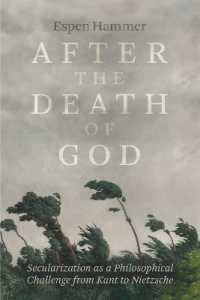- ホーム
- > 洋書
- > 英文書
- > Religion / Ethics
Full Description
The Burden of Silence is the first monograph on Sabbateanism, an early modern Ottoman-Jewish messianic movement, tracing it from its beginnings during the seventeenth century up to the present day. Initiated by the Jewish rabbi Sabbatai Sevi, the movement combined Jewish, Islamic, and Christian religious and social elements and became a transnational phenomenon, spreading througout Afro-Euroasia. When Ottoman authorities forced Sevi to convert to Islam in 1666, his followers formed messianic crypto-Judeo-Islamic sects, Dönmes, which played an important role in the modernization and secularization of Ottoman and Turkish society and, by extension, Middle Eastern society as a whole.
Using Ottoman, Jewish, and European sources, Sisman examines the dissemination and evolution of Sabbeateanism in engagement with broader topics such as global histories, messianism, mysticism, conversion, crypto-identities, modernity, nationalism, and memory. By using flexible and multiple identities to stymie external interference, the crypto-Jewish Dönmes were able to survive despite persecution from Ottoman authorities, internalizing the Kabbalistic principle of a "burden of silence" according to which believers keep their secret on pain of spiritual and material punishment, in order to sustain their overtly Muslim and covertly Jewish identities. Although Dönmes have been increasingly abandoning their religious identities and embracing (and enhancing) secularism, individualism, and other modern ideas in the Ottoman Empire and modern Turkey since the nineteenth century, Sisman asserts that, throughout this entire period, religious and cultural Dönmes continued to adopt the "burden of silence" in order to cope with the challenges of messianism, modernity, and memory.
Contents
List of Tables and Illustrations
Acknowledgments
List of Abbreviations
Notes on Transliteration
Introduction
Chapter I: Remapping a Messianic Movement in the Early Modern World
Chapter II: The Rise and Fall of the Sabbatean Movement in the Eurasian World
Chapter III: From a Global Movement to an Ottoman Sect: The Birth of a Crypto-Messianic Community
Chapter IV: Authority, Authenticity, and Leadership: Failed Prophecy and the Emergence of Post-Messianic Sects in the Ottoman Empire and Eastern Europe
Chapter V: Politics of Crypto and Hybrid Identities among the Jews, Christians and Muslims
Chapter VI: Religious Beliefs and Practices in Parallel Space and Time
Chapter VII: The Experience of Modernity: The Emergence of Orthodox, Reformist and Liberal Dönmes
Chapter VIII: From Empire to Nation-State: Resettlement in Modern Turkey
Conclusion: Passion for the Waiting
Bibliography
Index






